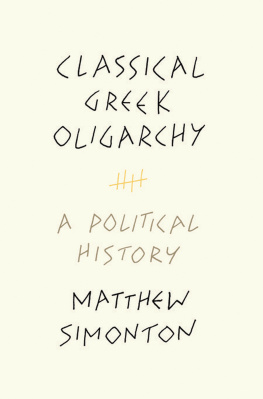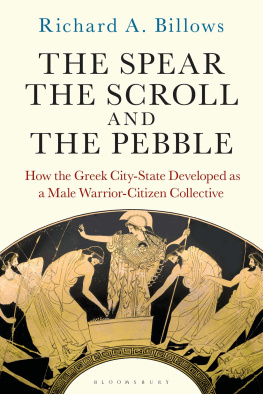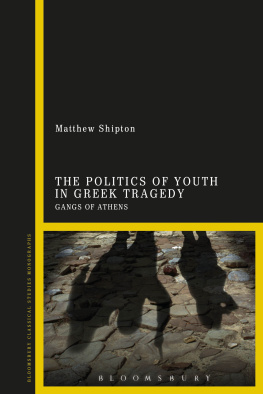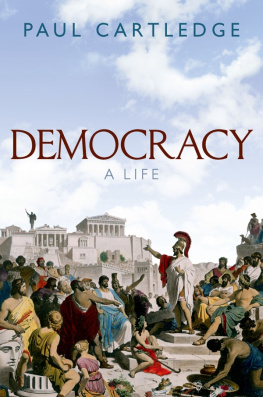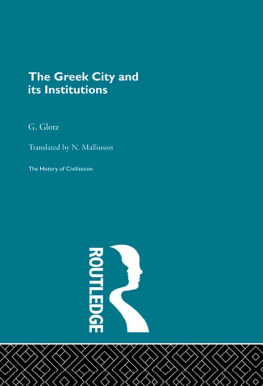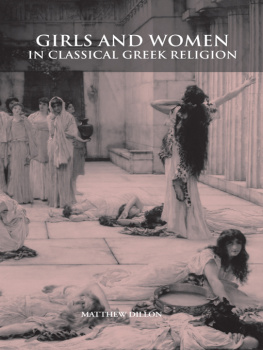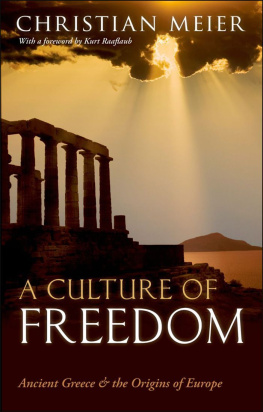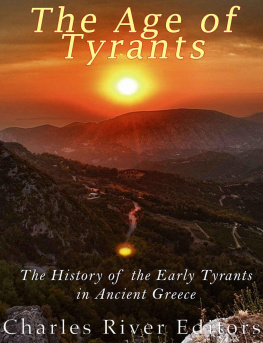
CLASSICAL GREEK OLIGARCHY
Classical Greek Oligarchy
A POLITICAL HISTORY
MATTHEW SIMONTON
PRINCETON UNIVERSITY PRESS
PRINCETON & OXFORD
Copyright 2017 by Princeton University Press
Published by Princeton University Press,
41 William Street, Princeton, New Jersey 08540
In the United Kingdom: Princeton University Press,
6 Oxford Street, Woodstock, Oxfordshire OX20 1TR
press.princeton.edu
All Rights Reserved
ISBN 978-0-691-17497-6
Classical Greek Oligarchy
Library of Congress Cataloging in Publication Control Number: 2016059885
British Library Cataloging-in-Publication Data is available
This book has been composed in Arno Pro
Printed on acid-free paper.
Printed in the United States of America
10 9 8 7 6 5 4 3 2 1
To my family
CONTENTS
PREFACE
Oligarchy is one of the many ancient Greek words that have continued to be employed as terms of political analysis centuries after they were first developed. Its staying power stems in part from the lasting appeal of the ancient Greek tripartite model of government. The idea of political regimes being defined according to whether they are ruled by the one, the few, or the many is simple, elegant, and (in theory, at least) easy to operationalize. Under this schema, a regime in which the few hold powerand those few are almost always the wealthyought to be readily identifiable as an oligarchy. In fact, as everyone knows, in states as large and as complex as modern representative governments, classification is a fraught enterprise. Everything depends on what we mean by power and how we propose to measure who has it. Nevertheless, in recent years a new focus on oligarchy has emerged. Several political scientists have proposed that the U.S. system, despite our constant talk of democracy, is best described as an oligarchy (Winters and Page 2009; Gilens and Page 2014). The concern that government of, by, and for the people is corroding under the influence of an unrepresentative few is growing stronger on both the left and the right ends of the political spectrum. Feelings of insecurity and suspicion toward the elite (however defined) are fueling resentment against what is perceived as an inequitable status quo. At the time of writing, the United States and Europe are entering a period in which largely taken-for-granted assumptions about what it means to be a liberal democratic society are being upended. Are we witnessing the takeover of government by narrow interests? A reassertion on the part of the people (or rather some portion of the electorate) against the elite? Both at the same time? No matter what constitutional labels we decide to apply to our political systems, current trends are disturbing to those who care about justice, equality, and human rights. It is very difficult to know what the future of our politics will hold. (See Cartledge 2016 for the story of democracy so far.) Whatever happens electorally, however, the increasing concentration of wealth will almost certainly continue.
Against this backdrop I hope it will prove rewarding to return to the origins of oligarchy in ancient Greece. Despite the persistence of the word, we have so far not understood very well what it meant in actual practice in its historical context. With any luck the present study will shed some light on that question. It does not presume to supply solutions to the problems alluded to above (assuming one considers them problems). In fact, I continue to vacillate on whether ancient Greek governmentand in particular the constitutional type we tend to consider most familiar, democracycan tell us much of anything about how we ought to conduct our political life today. It will become obvious, however, that I do believe we can better understand the historical events of ancient Greece through the use of contemporary theories and methods. In other words, this is a positive rather than a prescriptive work. It is intended to explain, not to advise. That mission statement will probably read as obvious to ancient historians, the books primary audience, for whom value judgments do not usually enter into the equation. It might be more disappointing to political theorists, who are often interested in normative questions, and from whose work I have benefited greatly. Nevertheless, they may find the project worthwhile insofar as it better situates ancient thinkers such as Plato and Aristotle in their historical milieu. Most political theorists read Aristotles Politics for the insights contained in the theoretical books (13); I hope to show that the historical or empirical books (46) also illuminate ancient political thought.
A warning to every potential reader: the patchy state of the evidence allows for extremely divergent reconstructions and interpretations. I have therefore often felt it necessary to indicate (at length) the place of the present study in historiographical debates. I have tried to confine these digressions to the footnotes, so that a more general audience can avoid being bogged down in scholarly arcana, while interested specialists are still able to check my reasoning. I also thinkthough this may turn out to be hubristhat Classical Greek oligarchy, as a topic, can be treated exhaustively (but I hope not exhaustingly) in a single monograph, with all relevant pieces of evidence cited. In any case, it seems like good practice in a work with a guiding theory to furnish all the evidence necessary for potentially disproving the argument. Likewise, understanding oligarchy requires the accurate interpretation of complicated passages and even of individual words in the original Greek. I have attempted, however, to limit the amount of Greek text in the book, and to provide English translations. This is all to say that while some of the notes may strike the eye as long and complicated, the book is meant to be approachable to nonspecialists. Those who have less of an interest in issues of Archaic Greek political development, and who require less convincing that Classical Greek oligarchy was a form of authoritarianism, may want to skip .
The subtitle of this book is A Political History. The history part has been explained above, as a way of distinguishing the study from normative political , I find it useful to analyze these actions under the rubric of institutions. With this term, however, I do not restrict myself to political institutions conventionally and narrowly understoodvoting bodies, magistracies, laws, and so on. The exercise of power in an oligarchyas in a democracyextended beyond formal rules, to broader communal practices, many of which will be familiar to scholars of Greek religion and poetry. I hope to show that such practices are no less amenable to institutional analysis, at least as I understand it. Observers of the Greeks have long recognized that power and culture were inextricably intertwined in the ancient world. The present book suggests how that connection affected the regime known as oligarchia in particular. In doing so it has tried to concern itself with what a stimulating piece calls the places of the political in ancient Greece, as opposed to simply politics (Azoulay and Ismard 2007). By political in the subtitle, therefore, one should understand dealing with the workings of power and institutions, broadly conceived, within societies (oligarchic poleis) characterized by a common constitutional system.
ACKNOWLEDGMENTS
Writing this book would not have been possible without the help of many people. It began its life as a dissertation under the direction of Josiah Ober, to whom I continue to owe profound thanks for his insight, inspiration, encouragement, and friendship. Richard Martin, Ian Morris, and Andrea Nightingale also provided valuable feedback. A Stanford Interdisciplinary Graduate Fellowship allowed me to develop the theoretical framework employed in the book.
Next page
